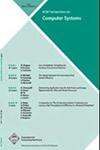通过操作系统调度利用核心专门化来提高非对称多核系统的性能
IF 2
4区 计算机科学
Q2 COMPUTER SCIENCE, THEORY & METHODS
引用次数: 46
摘要
非对称多核处理器(AMPs)由具有相同ISA(指令集架构)的核心组成,但具有不同的微架构特性、速度和功耗。由于具有更复杂功能和更高速度的核心通常比更简单和更慢的核心使用更多的面积和消耗更多的能量,因此我们必须使用这些核心来运行通过使用这些功能而获得显着性能改进的应用程序。在单个系统中使用不同类型的核心可以优化性能/能量权衡。为了向未修改的应用程序提供这种潜力,操作系统调度器必须将线程映射到内核,同时考虑两者的属性。我们的工作描述了一个非对称多核处理器(CAMP)的综合调度器,它解决了以前的非对称感知调度器的缺点。首先,以前的调度器只满足一种对amp上的调度至关重要的工作负载属性;要么是效率,要么是线程级并行性(TLP),但不能两者兼而有之。CAMP克服了这一限制,显示了如何在单个调度算法中协同使用效率和TLP可以提高性能。其次,大多数现有的调度器依赖于模型来估计线程在“快”与“慢”内核上的执行速度(即加速因子)是专门为AMP系统设计的,其中内核仅在时钟频率上有所不同。然而,更现实的AMP系统包括在功能上差异更大的内核。为了证明CAMP在更现实的场景中的有效性,我们用一个模型增强了CAMP调度器,该模型预测了与未来非对称系统密切匹配的真实AMP原型的加速因子。本文章由计算机程序翻译,如有差异,请以英文原文为准。
Leveraging Core Specialization via OS Scheduling to Improve Performance on Asymmetric Multicore Systems
Asymmetric multicore processors (AMPs) consist of cores with the same ISA (instruction-set architecture), but different microarchitectural features, speed, and power consumption. Because cores with more complex features and higher speed typically use more area and consume more energy relative to simpler and slower cores, we must use these cores for running applications that experience significant performance improvements from using those features. Having cores of different types in a single system allows optimizing the performance/energy trade-off. To deliver this potential to unmodified applications, the OS scheduler must map threads to cores in consideration of the properties of both. Our work describes a Comprehensive scheduler for Asymmetric Multicore Processors (CAMP) that addresses shortcomings of previous asymmetry-aware schedulers. First, previous schedulers catered to only one kind of workload properties that are crucial for scheduling on AMPs; either efficiency or thread-level parallelism (TLP), but not both. CAMP overcomes this limitation showing how using both efficiency and TLP in synergy in a single scheduling algorithm can improve performance. Second, most existing schedulers relying on models for estimating how much faster a thread executes on a “fast” vs. “slow” core (i.e., the speedup factor) were specifically designed for AMP systems where cores differ only in clock frequency. However, more realistic AMP systems include cores that differ more significantly in their features. To demonstrate the effectiveness of CAMP on more realistic scenarios, we augmented the CAMP scheduler with a model that predicts the speedup factor on a real AMP prototype that closely matches future asymmetric systems.
求助全文
通过发布文献求助,成功后即可免费获取论文全文。
去求助
来源期刊

ACM Transactions on Computer Systems
工程技术-计算机:理论方法
CiteScore
4.00
自引率
0.00%
发文量
7
审稿时长
1 months
期刊介绍:
ACM Transactions on Computer Systems (TOCS) presents research and development results on the design, implementation, analysis, evaluation, and use of computer systems and systems software. The term "computer systems" is interpreted broadly and includes operating systems, systems architecture and hardware, distributed systems, optimizing compilers, and the interaction between systems and computer networks. Articles appearing in TOCS will tend either to present new techniques and concepts, or to report on experiences and experiments with actual systems. Insights useful to system designers, builders, and users will be emphasized.
TOCS publishes research and technical papers, both short and long. It includes technical correspondence to permit commentary on technical topics and on previously published papers.
 求助内容:
求助内容: 应助结果提醒方式:
应助结果提醒方式:


